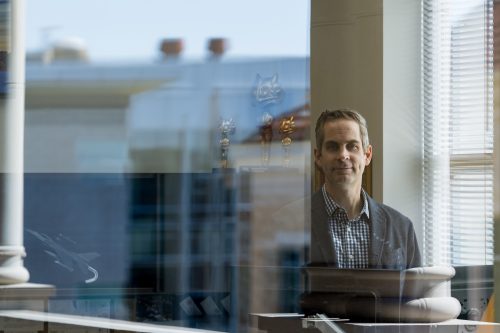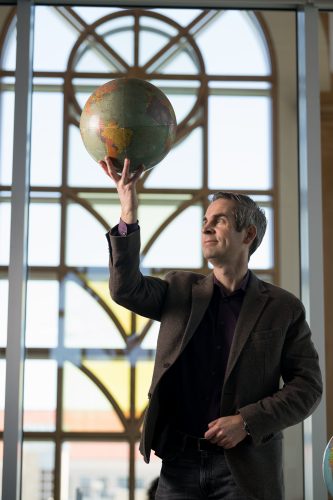Rattling the Supply Chain
Tyson Browning studies the unintended consequences of punitive economic actions.

Tyson Browning, professor of information systems in the Neeley School of Business, has discovered via his research a domino effect that is the by-product company boycotts.
Rattling the Supply Chain
Tyson Browning studies the unintended consequences of punitive economic actions.
ECONOMIC SANCTIONS AND CONSUMER BOYCOTTS aim to protest companies’ or countries’ bad behavior, such as using child labor or conducting animal testing, and prompt them to change. While such actions can gain quick momentum on a connected global stage, sometimes uninvolved people and companies can get caught in the snare.
“When you have economic sanctions or boycotts, you end up affecting a lot of others either intentionally or unintentionally,” said Tyson Browning, professor of operations management in TCU’s Neeley School of Business. “During a boycott, it’s not just hurting that company directly but all the other suppliers — from farmers to packing suppliers to transportation people.”
The resulting collateral damage to supply chain networks from sanctions or boycotts is the focus of an article co-written by Browning and published in the April 2023 Production and Operations Management journal.
As an example, the authors cite sanctions against Qatar in 2017 by Saudi Arabia, Bahrain, Egypt and the United Arab Emirates. The sanctions aimed to restrict trade over Qatar’s alleged role in financing terrorism.

Tyson Browning and two co-authors discovered that 2017 sanctions against Qatar created logistics issues and higher costs that resulted in unfinished lodgings for the 2022 FIFA World Cup.
Logistics problems and higher supply chain costs resulted in unfinished and insufficient lodgings for the 2022 FIFA World Cup.
Such cascading supply chain snarls “seem to disproportionately affect the people less equipped to handle those effects,” such as people of color, oppressed groups or economically disadvantaged people or groups, Browning said. “An irony we discovered was well-meaning [diversity, equity and inclusion] initiatives that would run up against some complications with sanctions and boycotts.”
He and his co-authors — Timofey Shalpegin, an information systems and operations management lecturer at the University of Auckland Business School in New Zealand, and Ajay Kumar, associate professor at Emlyon Business School in Lyon, France — say their intent wasn’t to judge whether sanctions and boycotts are good or bad. They wanted to provide a framework for supply chain managers to consider when making decisions about supply networks in reaction to sanctions and boycotts or to safeguard their systems against potential disruptions.
Browning, who joined TCU in 2003, has a wealth of experience in complex business, operating and process systems. When he worked at Lockheed Martin Aeronautics Co. as a senior project manager, he led development of companywide enterprise processes and engineering best practices. At the Massachusetts Institute of Technology’s Lean Aerospace Initiative, he researched new product and organizational practices for companies including Boeing, McDonnell Douglas and Texas Instruments Inc. He holds a Six Sigma Black Belt, meaning he’s a certified expert in improving business processes and identifying and eliminating waste within supply chains.
“Tyson’s expertise and knowledge in the field are truly evident,” Kumar said. “Tyson is an excellent researcher, critical thinker and mentor.”
Browning has written nearly 50 peer-reviewed articles and was a finalist for TCU’s 2023 Chancellor’s Award for Distinguished Achievement as a Creative Teacher and Scholar.
“He takes a systems view of things — the big picture view,” said Jeff Stratman, chair of Information Systems and Supply Chain Management at Neeley. “That shows through in his latest article.”
Browning’s article notes that economic sanctions, which date to ancient Greece, have grown significantly in recent years. The number of active international sanctions rose from fewer than 50 in the 1960s to more than 200 in the 2010s, and continues to rise.

Tyson Browning, who joined TCU in 2003, has seen a recent spike in economic sanctions and the unintended consequences they can create.
That uptick increases the chances of companies being directly affected by sanctioned or boycotted suppliers.
Blanket boycotts or sanctions also could block access to foreign markets. In 2020, several big global apparel retailers, including Adidas, H&M and Zara, boycotted all cotton farmers in China’s Uyghur region for allegedly using forced labor, Kumar said, which affected smaller farmers not under suspicion. The move also backfired after Chinese consumers then boycotted some of the retailers, he added.
Restricted access to technology can mean companies can’t buy crucial equipment or tools. U.S. and European Union sanctions on equipment exports for Iran’s oil- and gas-related industries created fallout on the transportation sector. For one, the city of Tehran postponed adoption of European emission standards because it couldn’t procure the necessary diesel particulate filters for 700 older buses.
Sanctions and boycotts targeting shipping or cargo handlers can create widespread logistics problems. The refusal last year by some port workers in the Netherlands, Sweden, the United Kingdom and elsewhere to handle Russian cargo after that country’s invasion of Ukraine disrupted oil and natural gas shipments to Europe.
Browning urges operations and supply chain managers to “think about the cascading of risk through the whole system” to mitigate collateral damage from sanctions or boycotts.

Your comments are welcome
Comments
Related reading:
Life on the Fringe
Tricia Jenkins’ podcast on growing up in a cult draws acclaim.
Immersed in Exercise
Kinesiologist Robyn Trocchio turns to virtual reality to help people have fun getting fit.
Deeper Compassion
Joe Hoyle’s capstone project examines the impact of empathy training on scuba volunteers.